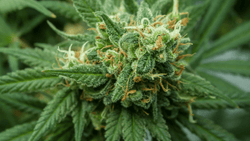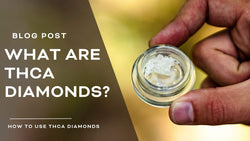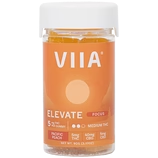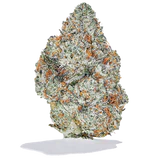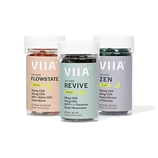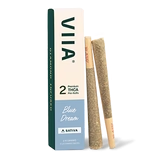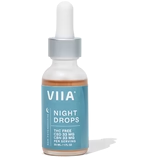
Understanding THCA: Non-Psychoactive Precursor To THC
THCA is a cannabinoid that we've been passionate about since the 2018 Farm Bill made hemp products widely accessible. Unlike THC, THCA doesn’t cause a "high" on its own—it only transforms into THC when heated.
In this article, we’ll break down what makes THCA special, how it compares to THC, and the possible benefits of adding THCA to your routine.
What Exactly is THCA?
THCA is short for tetrahydrocannabinolic acid and is a natural compound found in raw cannabis plants before they're heated. It's technically THC's parent cannabinoid since it turns into THC when exposed to heat.
THCA is non-intoxicating, which means it won't make you feel "high" on its own, but many researchers believe it still has a lot of potential benefits similar to THC. It's also a fascinating part of the cannabis conversation because, in its raw form, it's legal in many places where THC is not.
Beyond this, THCA is interesting because of its potential wellness benefits and how it connects us to cannabis's broader uses, from wellness to new product innovations in the hemp industry.

Quick Facts About THCA
Want the quick facts on THCA? We've got you covered with a condensed article takeaway section.
- Definition: THCA is a non-psychoactive cannabinoid found in raw cannabis that does not produce the "high" associated with THC.
- Benefits: Many people are using THCA for its potential wellness benefits for stress, normal inflammatory function, and brain health, but without the intoxicating effects of traditional cannabis THC products.
- Activation: THCA must be decarboxylated (heated) to convert to THC and produce psychoactive effects. If you don't want to experience the psychoactive effects of THC, consume your THCA products raw (unheated).
- Legality: Hemp-derived THCA is legal in the United States as long as it has less than 0.3% THC by weight.
What Are The Potential Health Benefits Of THCA?
A study published by the National Institutes of Health (NIH) found that THCA may have beneficial healing properties thanks to its immune-supporting potential. This suggests that THCA could help manage conditions characterized by aches and discomfort.
Another study found in the NIH indicated that THCA might have neuroprotective effects. The researchers found that THCA could protect brain cells from oxidative stress, which is involved in developing neurodegenerative diseases.
Additionally, some evidence suggests that THCA may have antiemetic properties, meaning it could help reduce nausea and vomiting. This could be particularly beneficial for individuals undergoing chemotherapy or those with conditions that cause chronic nausea.
Despite the potential benefits, more research is needed to fully understand the potential health benefits of THCA. While these initial studies are promising, further clinical trials are necessary to establish the efficacy and safety of THCA for various health conditions.

Forms Of THCA
THCA is available in several forms, each with unique characteristics and uses. Popular forms include
- THCA flower
- THCA vapes
- Gummies and other Edibles
- Tinctures and Concentrates
THCA Flower
THCA flower is the raw, unheated form of hemp or cannabis buds. These flowers are rich in THCA and can be used to make various products, such as tinctures and topicals. One of the main advantages of THCA flower is that it allows you to experience the potential benefits of THCA without the overpowering psychoactive effects of THC.

When consuming THCA flower, it's important to remember that exposing the flower to heat and fire will convert the THCA to THC, resulting in psychoactive effects. The high from THCA is typically more mellow / less psychoactive than THC products due to the tested percentage difference of THC.
THCA Concentrates
THCA concentrates are highly potent products that offer a concentrated dose of THCA. They’re made by extracting THCA from hemp or cannabis plants using either solvent or CO2 extraction.
THCA concentrates can be used in a handful of ways, including dabbing and vaping. Dabbing involves heating the concentrate on a hot surface, while vaping uses a vape device to heat the concentrate and produce an inhalable vapor.
One of the main advantages of THCA concentrates is their high potency, which allows you to experience the potential benefits of THCA in a more concentrated form. However, this high potency also comes with strong effects.
When purchasing THCA concentrates, look for products that have been third-party tested for purity and potency. This will ensure that you’re getting a safe, high-quality product that contains the amount of THCA advertised. At VIIA, for example, each of our THCA products are third-party tested and posted on our website to give you the peace of mind that comes with a quality product.
Hemp Gummies

Hemp derived gummies offer a convenient and discreet method for consuming THCA. They allow for easier consumption management, providing precise doses in each serving, which makes it simple to control your intake.
Hemp gummies are also a good option for those who prefer not to inhale vapor or smoke, as they allow you to consume THCA orally. This can be particularly beneficial if you have respiratory issues or simply prefer edibles over smoking or vaping.
As with any first-time product, it's also important to start with a low dose (usually 5-10mg) and wait at least an hour before consuming more, as the effects of edibles can take longer to kick in compared to other consumption methods.
THCA Chemical Composition

Did you know that you could eat large quantities of raw cannabis flowers and wouldn't get high?
This is because raw cannabis flowers have very low concentrations of THC, the main psychoactive compound. However, it is rich in THCA, which is a non-psychoactive cannabinoid.
When raw cannabis flowers or concentrates high in THCA are exposed to heat, they can convert into THC, creating a psychoactive substance that is sometimes used as a legal alternative to marijuana.
THCA converts into THC when it undergoes a process called decarboxylation, which is essentially heat exposure that results in breaking off a carboxylic acid group from the molecule structure.

All cannabinoids start in their cannabinoid acidic form. CBD is CBDA, CBG is CBGA, and so on.
It's not until these compounds are exposed to heat that we get their non-acidic form, which some people may call "activated form. " However, this is a bit of a misconception, as acidic cannabinoids appear to have potential wellness benefits, too.
Until recently, it was believed that these cannabinoids required "activation" through decarboxylation to make them bioavailable to interact with the body's endocannabinoid system and that without this step, cannabis products may not provide the same level of benefits.
But with more recent medical cannabis research, we now understand that just because the endocannabinoid CB1 receptor is much more receptive to THC — which is why it produces psychoactive effects —it doesn't mean that THCA doesn't have any potential value.
In fact, many people consider raw cannabis buds to be a superfood and add them to smoothies and salads as wellness supplements.
THCA vs. THC: What's The Difference?
The main difference between THCA and THC is that THCA must be exposed to UV light or heat to initiate decarboxylation to transform it into THC, where it can then produce psychoactive effects.
In terms of how THCA and THC work in the body, you can think of the endocannabinoid system as a set of locks and the cannabinoids as keys that fit into those locks to produce various effects.
THC products produce elevating effects by unlocking the actions of the CB1 receptor. Many people find these effects enjoyable for unwinding from a long day, facilitating social gatherings, or enhancing creative work.
On the other hand, THCA molecules are keys that don't quite fit into the locks to induce prominent psychoactive effects on the CB1 receptors in the central nervous system.
However, it does seem to support the overall endocannabinoid system function, which is a complex network designed to support the balance of the body's key biological processes, but it may also have other unique properties that support the body's mechanisms in handling inflammation and oxidative stress [1, 2].
The Potential Benefits Of THCA
The research surrounding the hemp and marijuana plants and their potential benefits is focused mainly on THC and CBD, but that doesn't stop consumers from trying other cannabis-based products themselves.
Here are some of the purported benefits of THCA.
1. THCA Is Believed To Have Immune System Supporting Properties
THCA, like many of the cannabis plant cannabinoids, may have the potential to support the immune system. Inflammation is part of the body's defense and repair mechanisms against injury or injection. However, it can also become chronic and contribute to a number of ailments.
Foods that are high in anti-inflammatory properties, like turmeric, green tea, berries, and even cannabis, may support the body's ability to self-regulate the inflammatory response. All these foods are high in anti-oxidant compounds, which support the body's ability to regulate inflammation.
In addition, the endocannabinoid system regulates the immune response [3]. The cannabis plant is home to many chemical compounds that interact with the ECS to support its regulatory functions.
Early research, mostly conducted on animal models, has found THCA to have a positive effect in reducing the release of inflammatory markers [1, 4, 5]. This doesn't mean that these effects are as potent in humans, but these results open doors to further exploration.
2. THCA May Support And Protect Brain Health
A study published in 2017 investigated the potential neuroprotective benefits of THCA and other cannabinoids and found that THCA may have neuroprotectant properties that help to support the health of nerve cells in the central nervous system through its effects on a pathway called PPARγ [6].
Neuroprotectants are important because they help preserve the integrity of nerve cells in the brain and central nervous system, supporting healthy aging and brain injury recovery.
Even with the early positive findings on THCA for brain health, more studies and clinical trials are needed to uncover its full potential in this application.
3. THCA For Relaxation
There are many personal accounts of people reaching for taw THCA for relaxation and stress management without the intoxicating effects of THC.
While we could not find much specifically looking at THCA's therapeutic potential for stress, it might work the same way as many other cannabinoids in supporting the endocannabinoid's function to regulate mood and stress overall [7].
How To Use THCA
Raw THCA Products
When shopping for THCA products and still wanting to leverage the potential wellness effects of THCA without converting it into THC, you want to make sure you're choosing a product you don't have to heat up to use it.
Remember, once the THCA is exposed to heat, it transforms into THC and becomes psychoactive, producing slightly different effects in the body.
Some of the most straightforward ways of using THCA is with high THCA flower.

You can try adding raw cannabis to your diet by blending it into your smoothies and juices or incorporating it into salads or other raw dishes as a raw food supplement.
If you're not keen on the earthy taste of THCA cannabis flower, you can try THCA gummies.
THCA gummies are made with raw cannabis extract high in the THCA cannabinoid. They contain pre-measured doses and are usually combined in a tasty candy formula that makes getting your daily intake of THCA much more enjoyable.
Smokable THCA Products
Other common THCA products, such as THCA pre-rolls (joints), THCA diamonds (concentrate), and THCA vapes, are another story. These products are meant to be smoked (or vaped), essentially exposing the compound to heat and transforming it into THC.
The raw cannabis plant can sometimes act as a loophole in some states to strict marijuana laws since hemp plants are defined as cannabis plants with less than 0.3% THC by dried weight.
Technically, these plants don't have THC yet in their raw form, as it still exists as THCA.
In this case, people might choose to purchase legal THCA and convert it themselves into THC for the elevated sensory experience.
For those who live in states that haven't legalized marijuana products for recreational use, this may be one of their only options for smokable cannabis products with psychoactive effects.
If that's what you're after, remember that THCA diamonds may require extra equipment to set up, such as a dab rig or a vaporizer device that allows for concentrates.

THCA diamonds are essentially concentrated and crystalized THCA that can be up to 99.9% pure, depending on the quality of extraction and processing.
In comparison, you can use pre-rolled THCA joints and most THCA vape pens right out of the package.
Smoking may not be for everyone, and you should keep in mind that smoking THCA will lead to intoxicating effects, so please use it responsibly.
THCA Dosing (How Much To Take)
The optimal dosage of THCA may vary depending on body weight, tolerance, and the desired effects.
When consuming THCA products that have been heated, such as THCA vapes or THCA pre-rolls, start with a low dose (usually 2.5 - 5mg of THC) and gradually increase until you achieve the desired effects.
For non-heated THCA products, such as THCA flower or THCA gummies, a starting dose of 10-25mg per day is generally considered safe. However, you may want to start with the lowest possible dose and increase gradually as needed to avoid taking too much and risking uncomfortable side effects.
When using THCA concentrates, such as THCA diamonds, we suggest starting with a very low dose (as low as 1-2mg) and increasing slowly, as these products are much more potent than other forms of THCA.
THCA's effects can vary depending on the consumption method. Inhaled THCA, such as through vaping or smoking, will produce effects more quickly (usually within minutes) than oral consumption, such as through edibles or tinctures (which can take up to an hour or more to kick in).
Side Effects of THCA
As a relatively new cannabinoid, the extent of its long-term use, THCA, is largely unknown. However, like most cannabinoids, THCA is safe and non-toxic for most individuals.
And while high-quality THCA products are generally safe, it's still possible to experience side effects.
Luckily, the side effects are mild and temporary but may include:
- Stomach upset
- Changes in appetite
- Drowsiness or fatigue
- Dry mouth
- Medication interaction
Taking the appropriate doses can mitigate the chances of having a bad experience with THCA. This means starting with lower doses and working your way up slowly to allow your endocannabinoid system to adjust to the supplemented cannabinoids.
Does THCA Show up on a Drug Test?
THCA itself may not show up on a standard drug test. However, if THCA is heated and converted to THC, it can lead to a positive drug test result.
Recap: What Is THCA?
THCA (tetrahydrocannabinolic acid) is a non-psychoactive compound found in raw cannabis plants, and it's the acidic precursor to THC (tetrahydrocannabinol), which is the primary psychoactive compound in cannabis.
The cannabis plant produces over a hundred compounds that interact with cannabinoid receptors in the body's endocannabinoid system.
While most of the research on the health benefits of cannabis is centered around THC and CBD, many people are curious about cannabis extracts like THCA.
There are plenty of personal accounts of people eating raw cannabis and THCA gummies as part of their wellness regime for similar benefits of THC but without the intoxicating effects. Or, in the case of smokable, hemp-derived THCA products, it may be one of the only legal options to experience the fun, elevating effects of cannabis.
Research & Resources:
- Ruhaak, L. R., Felth, J., Karlsson, P. C., Rafter, J. J., Verpoorte, R., & Bohlin, L. (2011). Evaluation of the cyclooxygenase inhibiting effects of six major cannabinoids isolated from Cannabis sativa. Biological and Pharmaceutical Bulletin, 34(5), 774-778.
- Dawidowicz, A. L., Olszowy-Tomczyk, M., & Typek, R. (2021). CBG, CBD, Δ9-THC, CBN, CBGA, CBDA and Δ9-THCA as antioxidant agents and their intervention abilities in antioxidant action. Fitoterapia, 152, 104915.
- Barrie, N., & Manolios, N. (2017). The endocannabinoid system in pain and inflammation: its relevance to rheumatic disease. European journal of rheumatology, 4(3), 210.
- Ruhaak, L. R., Felth, J., Karlsson, P. C., Rafter, J. J., Verpoorte, R., & Bohlin, L. (2011). Evaluation of the cyclooxygenase inhibiting effects of six major cannabinoids isolated from Cannabis sativa. Biological and Pharmaceutical Bulletin, 34(5), 774-778.
- Nagarkatti, P., Pandey, R., Rieder, S. A., Hegde, V. L., & Nagarkatti, M. (2009). Cannabinoids as novel anti-inflammatory drugs. Future medicinal chemistry, 1(7), 1333-1349.
- Nadal, X., Del Río, C., Casano, S., Palomares, B., Ferreiro‐Vera, C., Navarrete, C., ... & Muñoz, E. (2017). Tetrahydrocannabinolic acid is a potent PPARγ agonist with neuroprotective activity. British journal of pharmacology, 174(23), 4263-4276.
- Komorowski, J., & Stępień, H. (2007). The role of the endocannabinoid system in the regulation of endocrine function and in the control of energy balance in humans. Advances in Hygiene and Experimental Medicine, 61.
